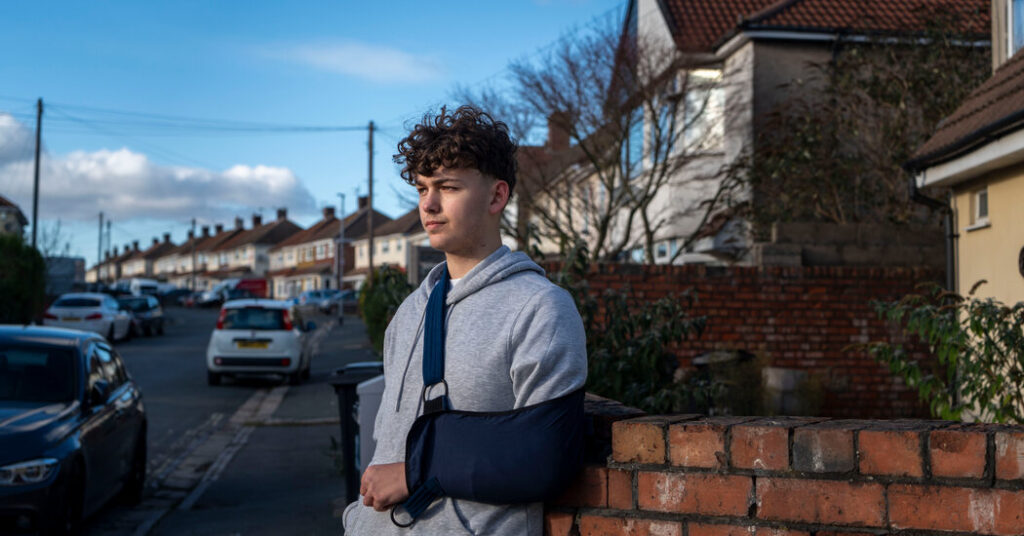Not so long ago, McKenzie Bartley, 19, was one of the many young people in Britain who could not find work.
For three months in 2024, he walked the streets of Bristol, a large city in southwest England, stopping in store after store to drop off his résumé. And he applied for dozens of jobs online.
Only one employer bothered to respond.
“You run out of money, and then you start getting desperate,” he recalled recently in his neighborhood in south Bristol, where the unemployment rate for young people is above the national average. “The least they could do is tell you why they haven’t chosen you.”
As Rachel Reeves, Britain’s chancellor, unveils her annual budget on Wednesday, persistent youth unemployment is one of the many challenges that will determine the success of her economic approach and test the already strained political support for the Labour government of Prime Minister Keir Starmer.
Mr. Bartley still lives with his parents, like many other young Britons who have been priced out of the housing market. Youth unemployment traditionally runs higher than overall unemployment, but the gap in Britain has widened in recent years. That is feeding into a sense of widening generational inequality, economists say, exacerbated by the generous payments extended to retirees by successive British governments and the real estate wealth of baby boomers.
At Labour’s annual conference in September, Ms. Reeves vowed to introduce programs to guarantee young people jobs, education or training. “We won’t leave a generation of young people to languish without prospects,” she said at the time. “I commit this Labour government to nothing less than the abolition of long-term youth unemployment.”
It will not be an easy task. Ms. Reeves and Mr. Starmer are stuck between their campaign-year promise not to raise taxes and Britons’ impatience for increased investment in public services after more than a decade of austerity imposed by the Conservatives. And they must solve that economic and political riddle amid a period of stubbornly sluggish growth.
Among the decisions the chancellor will announce on Wednesday is an increase in the minimum wage. Ms. Reeves will raise it by about 4 percent for workers 21 and over, to 12.71 pounds per hour (about $16.75), the Treasury said. And 18- to 20-year-olds will have a larger, 8.5 percent increase, to £10.85 an hour from £10, in a move toward making good on a campaign promise by Labour to establish a single adult rate.
While this will raise the incomes of young people who have jobs, some economists and businesses have warned that by increasing the cost of hiring young, inexperienced workers, youth unemployment could actually worsen.
Mr. Bartley now has a job, thanks in part to How to Be a Chef, a 12-week culinary course developed by a charity called Square Food Foundation. Since completing the course, which leads to professional qualifications, he has begun an apprenticeship at a chain of pubs called Mitchells & Butlers. He also preps ingredients one day a week at a Michelin-starred restaurant.
But many of his peers — in South Bristol and around the United Kingdom — are not so lucky.
Across Britain, more than 15 percent of young people aged 16 to 24 are unemployed, not in school or not receiving any training, according to government statistics. That is lower than its modern peak of 22 percent in 2011, after the financial crisis, but as high as it was in 2021, the year after the Covid-19 pandemic shut down large parts of the British economy.
In total, nearly 702,000 British youth were out of a job between July and September, the national statistics show.
In Bristol, a city of about 500,000 people, the overall youth unemployment rate is slightly better than the national average, at just over 11 percent. But in some of the city’s southern areas, where poverty is higher, youth unemployment is as high as 18 percent.
“Poverty and unemployment in South Bristol was a multigenerational, long-established issue,” said Jane Taylor, the head of service for employment, skills and learning at Bristol City Council. “This didn’t just happen.”
“We’ve lost the industry where families used to work and nothing has replaced that,” she added, referring to the collapse of the tobacco and cigarette manufacturing businesses that used to employ many of the city’s residents.
In June, the city started a new program aimed at trying to get some of the city’s youth back on track, funded by £1.1 million (about $1.4 million) from the national government. The program, called Youth Guarantee, provides young people with a four-week career counseling course and a guaranteed two-week job placement — a kind of tryout that officials say often leads to a permanent job.
In the five months since, the city has enrolled 139 young people in the course. Ms. Taylor said the city had been told there would be money to run the program for a second year. But beyond that is not clear.
“There’s probably going to have to be some hard conversations about what are we going to keep, what are the elements,” she said. “It will be looking at the numbers and what we’ve achieved.”
Even if the program receives more money, the broader issue of rising youth unemployment in Bristol is not likely to go away any time soon.
At City of Bristol College, which serves as a bridge for young people between the end of regular school and a university education, even full-time students say they are worried about the job market.
Five students gathered last week to discuss the issue, and all of them said it was a frequent topic of conversation.
“I’ve seen lots of students my age struggling, trying to get work and even the basic necessities,” Agastya Dhar, 17, said. Mr. Dhar has a part-time job in a French fry restaurant, but said even getting that job was tough.
“They don’t want students,” he said. “They want experience, but they don’t want to give you the job. They’ll give you the job, but they don’t want you being a student. It just doesn’t make sense in any scenario, you know?”
Kateryna Kalinina, 18, a Ukrainian in Britain on a student visa, said potential employers had told her that young people are “always not coming into work and they are not responsible for what they do.”
Others say there are many financial obstacles to finding a job. Jemima Williams, 16, said she felt caught in a circular problem.
“I’m coming on 17 now, so I might want a car, which would also help me get a job,” she said. “But to afford that car, I need to have a job.”
Jenna Cains, the head of student experience at the college, was quick to tell the students, “It’s not hopeless, I promise you.” She said the institution retooled its curriculum to focus as much on life after school as it does on the classroom instruction. Teachers now emphasize “personal development, employability, essential skills,” she said. “All of that plays on the future development of our young people.”
Mr. Bartley, from South Bristol, said he would like to eventually reopen the Pasta Palace, a small takeout restaurant his father owned but had to close a few years back. Their specialties: carbonara and lasagna, made fresh each morning.
“I want to eventually, at some point, open up my own business with him,” Mr. Bartley said. “Maybe, like a bigger restaurant, so people could actually come in and eat.”
Michael D. Shear is a senior Times correspondent covering British politics and culture, and diplomacy around the world.
The post ‘You Start Getting Desperate’: How It Feels to Be Young and Jobless in Britain appeared first on New York Times.




